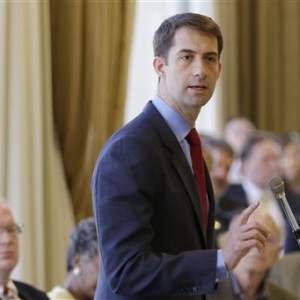Arkansas Sen. Tom Cotton introduced a bill Wednesday to stall National Security Agency surveillance reforms and make permanent an ever further-reaching set of surveillance powers scheduled to expire in two years, claiming those authorities will be needed in the battle against the Islamic State after last month’s attacks in Paris.
“On Sunday our constitutional, legal, and proven NSA collection architecture shifted to an untested, less effective system in the dead of the night,” Cotton said in a statement Wednesday.
On Nov. 29 the NSA shut down a program tasked with collecting virtually all Americans’ landline, and likely some wireless, telephone metadata records, including telephone numbers, dialed numbers, call durations and locations. In its place the signals intelligence agency now has to obtain a court order and go to phone companies directly to obtain specific records based on heightened search standards.
Cotton introduced the Liberty Through Strength Act shortly before Thanksgiving to prevent the transition from going forward in the wake of Islamic State-sponsored attacks in Paris last month. The bill was endorsed by Senate Majority Leader Mitch McConnell and 2016 GOP presidential candidate Sen. Marco Rubio of Florida, but stood little chance of gaining support ahead of the deadline established by the U.S.A. Freedom Act in May.
RELATED: After Paris, Rubio Wants to Put NSA Reforms on Hold
“This shift came at a time when our enemies are emboldened and we face an elevated national security threat,” Cotton said. “Worse, President Obama has decided that he will press delete on the metadata records we currently have, making it impossible to identify terrorist connections among these data that would reveal ISIS and Al Qaeda sleeper cells.”
Under the Liberty Through Strength Act II, the NSA would keep and search metadata records collected under the old system for five years, and make permanent surveillance authorities codified in Section 702 of the 2008 Foreign Intelligence Surveillance Amendments Act.
That authority allows the agency to conduct “upstream” surveillance by tapping into the physical infrastructure of the Internet, such as undersea fiber cables, to intercept the actual content of communications, including email text, photos and instant messages as they move in and outside U.S. borders.
RELATED: Federal Court Dismisses ACLU, Wikipedia Case Against NSA’s ‘Upstream’ Surveillance
“The gaps in our intelligence system created by the U.S.A. Freedom Act leave us less safe and provide us with fewer tools to fight our enemies,” Cotton said. “No matter what President Obama may think, it’s clear ISIS is not contained and that these gaps must be addressed before they attack us again. The Liberty Through Strength Act II ensures our intelligence community has the tools they need keep us safe.”
Numerous digital rights groups consider the authority more invasive than that formerly granted under Section 215 of the Patriot Act, because it allows the signals intelligence agency to view the actual content of Americans’ communications caught incidentally in the dragnet, rather than just metadata.
The American Civil Liberties Union, Electronic Frontier Foundation and others have already said they’ll fight any renewal of the law ahead of its expiration in late 2017.
Cotton’s second shot at the bill also makes permanent Patriot Act authorities renewed through 2019 that expired with Section 215 earlier this year, including the “lone wolf” provision, which gives gives intelligence agencies authorization to surveil targets not affiliated with targeted groups like the Islamic State, and “roving wiretaps,” which allow agencies to surveil multiple communication devices, like “burner” phones, belonging to a single terrorist suspect, instead of getting a warrant for each device.
According to the statement, the bill “clarifies the FBI’s authority” to use National Security Letters to demand records of digital communications from tech companies without a warrant, which companies must keep secret.
Lawmakers including Democratic Sens. Patrick Leahy of Vermont and Ron Wyden of Oregon are already lined up to tackle the renewal of Section 702 at the end of 2017, making it likely Cotton’s bill will face an uphill climb in the upper chamber.

